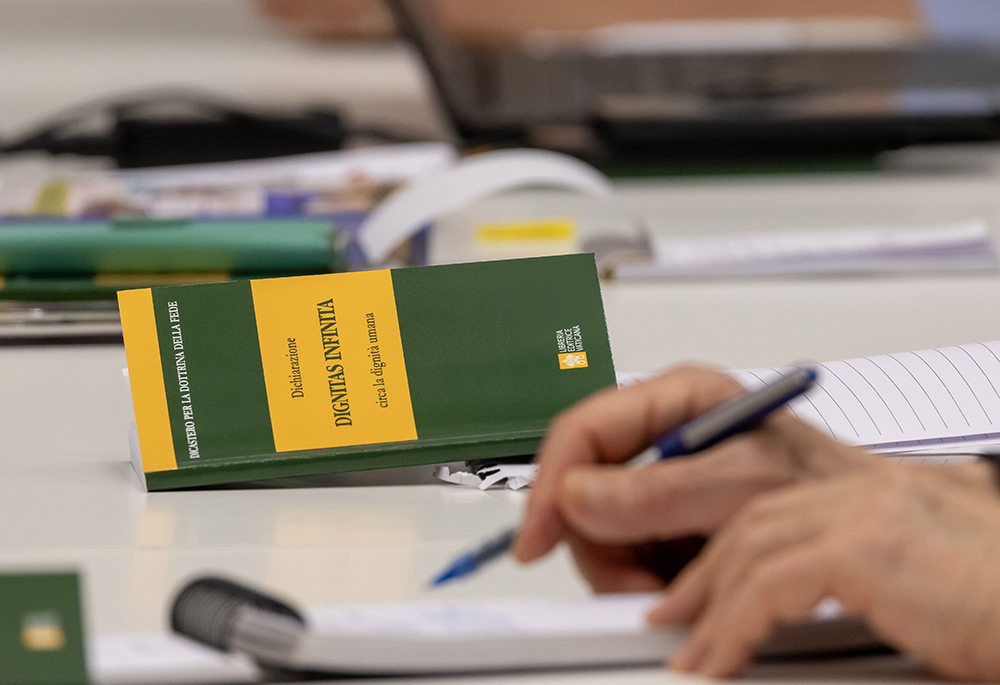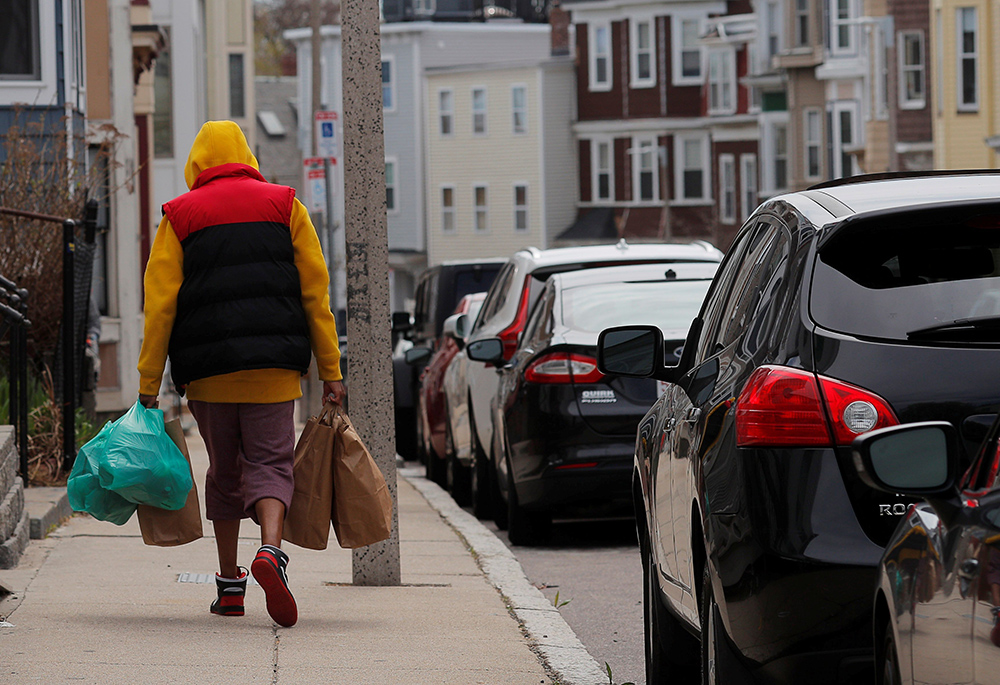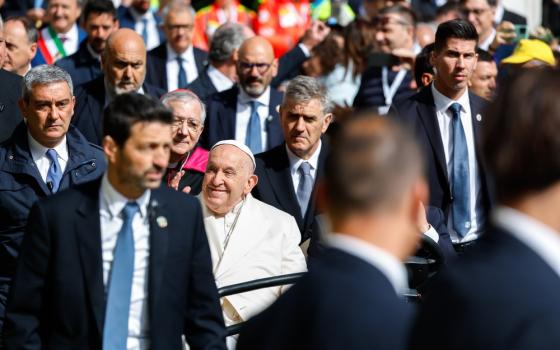
Cardinal Víctor Manuel Fernández, prefect of the Dicastery for the Doctrine of the Faith, takes notes during a news conference to present the dicastery's declaration, Dignitas Infinita ("Infinite Dignity") on human dignity, a copy of which is nearby, April 8 at the Vatican press office. (CNS/Pablo Esparza)
Dignitas Infinita ("Infinite Dignity"), the document published Monday by the Dicastery for the Doctrine of the Faith, confirmed something that has long been obvious to most Catholics: Pope Francis is not out to overturn the basics of Catholic moral teaching. What he has done is recalibrate the Catholic moral vision.
The cover letter from Cardinal Víctor Fernández included what is the most important shift Pope Francis has enacted. Recalling an audience with Francis on Nov. 13, 2023, at which the cardinal presented what he thought was a final draft, Fernández writes: "On this occasion, he also asked that the document highlight topics closely connected to the theme of dignity, such as poverty, the situation of migrants, violence against women, human trafficking, war, and other themes."
Gone are the days when issues related to pelvic theology can dominate the Catholic moral imagination. The teaching of the church addresses itself to socioeconomic as well as sexual sins. We are called to define our Christian ethical vision by looking above the belt and at the needs of our brothers and sisters, as well as considering issues of bioethical significance.
That is a large change, at least for the U.S. church, one that will take a generation to fully implement and digest. And it will require discipline by the church's members, especially her bishops, who must repeatedly ask as the pope does: But what about the poor? What about the other threats to human dignity? No one is saying that abortion doesn't matter. The document's most forceful language is directed at those who seek to obfuscate the issue. But abortion doesn't stand alone.
Dignitas Infinita does a masterful job explaining the different types of dignity — ontological, moral, social and existential — and roots the idea of dignity in the biblical narrative: "Born and raised in humble conditions, Jesus reveals the dignity of the needy and those who labor. Then, throughout his public ministry, he affirms the value and dignity of all who bear the image of God, regardless of their social status and external circumstances" (Paragraph 12). Dignity is intrinsic, it is "not something granted to the person by others" (Paragraph 15).

A woman walks away with free groceries from a food pantry and free hot meals from a church in Boston April 14, 2020. Poverty is among more than a dozen issues covered by a new Vatican document on human dignity. Dignitas Infinita ("Infinite Dignity") was released April 8, by the Vatican's Dicastery for the Doctrine of the Faith. (OSV News/Reuters/Brian Snyder)
This last point runs through the text: The central theological ideas of gift and grace are key to understanding the issues it addresses. "We do not create our nature," it says (Paragraph 9). "Our dignity is bestowed upon us by God; it is neither claimed nor deserved" (Paragraph 11). "To clarify the concept of dignity even further, it is essential to point out that dignity is not something granted to the person by others based on their gifts or qualities, such that it could be withdrawn" (Paragraph 15). "Freedom is a marvelous gift from God. Even when God draws us to him with his grace, he does so in a way that never violates our freedom. Thus, it would be a grave error to think that by distancing ourselves from God and his assistance, we could somehow be freer and thus feel more dignified" (Paragraph 30).
The most important, and controversial, application of the sense of gift is this:
Regarding gender theory, whose scientific coherence is the subject of considerable debate among experts, the Church recalls that human life in all its dimensions, both physical and spiritual, is a gift from God. This gift is to be accepted with gratitude and placed at the service of the good. Desiring a personal self-determination, as gender theory prescribes, apart from this fundamental truth that human life is a gift, amounts to a concession to the age-old temptation to make oneself God, entering into competition with the true God of love revealed to us in the Gospel.
In our time and place, rife with protean sensibilities, encomiums to autonomy and self-made heroes, this paragraph is exceedingly countercultural but it is the heart of the issue for Christian theology.
Unsurprisingly, the early critiques of the document all ignore or elide this foundational issue. An Associated Press story rounded up some reactions from transgender activists and not one acknowledged this core issue. Nor did the combative statement from New Ways Ministry's executive director Francis DeBernado.
The issue of how societies respond to the experience of gender dysphoria is complicated and in flux. In England, the National Health Service has terminated the practice of routinely prescribing puberty blockers to young people. Last August, I looked at the emerging differences between European and U.S. approaches to the issue of treating gender dysphoria. I reached two core conclusions: We should extend all the sympathy in the world to young people who experience gender dysphoria and no one should cavalierly invoke "the science" one way or the other about medical treatments. There are profound difficulties with many of the studies cited to justify various treatments of adolescents.
The issue is also changing as to how the rest of us address it. Last week, The New York Times published an article criticizing the use of the phrase "sex assigned at birth" co-written by Alex Byrne, a philosopher, and Carole Hooven, an evolutionary biologist.
"The shift to 'sex assigned at birth' may be well intentioned, but it is not progress," they write. "We are not against politeness or expressions of solidarity, but 'sex assigned at birth' can confuse people and creates doubt about a biological fact when there shouldn't be any. Nor is the phrase called for because our traditional understanding of sex needs correcting — it doesn't." They make a compelling case.
Advertisement
Every rule has an anomaly. It seems that those who advocate gender theory, as the Vatican document describes it, want the anomaly to vitiate the rule, which can't be right. Those who deny the existence of gender dysphoria seem unwilling to admit there is any anomaly, which can't be right either.
A final note. Unlike most Vatican texts in this pontificate, the pastoral dimension is largely absent from this document. This document acknowledges it doesn't provide final answers to every aspect of the issues it addresses. It does provide guardrails rooted in Catholic theology. It might be healthier some day if the Roman Curia left issues of pastoral application up to the local churches, but that day is far off.
In the meantime, we Catholics are ill-advised to simply dismiss this document as old-fashioned or worse. It touches on the most fundamental cleavage between our theology and our culture, the gap between a theology of grace and gratitude and a culture of grievance. Building a bridge across that gap will require a lot of goodwill and a lot of hard work.







